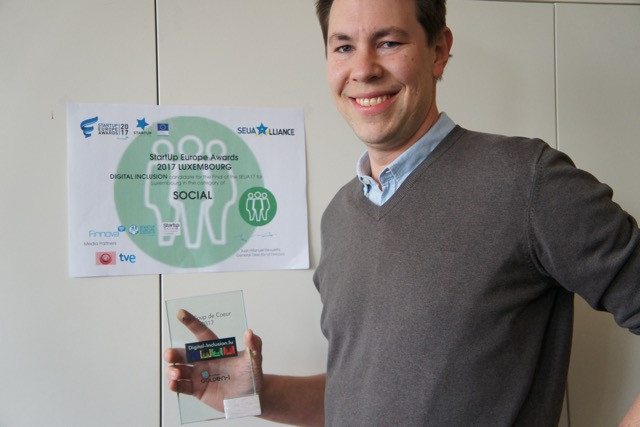Digital Inclusion opened pop-up offices and meeting rooms in an industrial building on route de Thionville earlier this year, after its last location in Bonnevoie was sold to developers.
The move enables the charity to expand its services to meet a growing need for laptops and computers and digital literacy teaching. “The demand was bigger than we could supply. Now we have a bigger classroom, we can help more people,” Digital Inclusion founder Patrick de la Hamette told Delano on Wednesday.
The temporary, 300-square-metre space, which comprises a classroom with capacity for 30 learners, offices, storage and a workshop, practically doubles the space they had previously. And it provides space for the eight-strong team of part-time employees, a workforce which will rise to 10 when two new projects are rolled out.
Refurbishing smartphones
The first involves the creation of a smartphone refurbishment service for people registered at the social office. “It’s obvious that most people need smartphones today,” de la Hamette said, adding: “At the same time they can be expensive if you consider buying them for your children or have to do repairs. Here, some people struggle. Often, they get smartphones but it’s a high cost factor in daily life. We want to distribute to people in need.”
The temporary offices of Digital Inclusion in Howald. Photo: Digital Inclusion
The new smartphone service is funded by Oeuvre’s YesWeCare project, which means the not-for-profit can recruit a staff member to refurbish phones and another to create certified training, so that others can learn to do the repairs and later find work in this field.
The social entrepreneur stresses that while smartphones are an important tool in a digitally inclusive society, people still require access to computers to be fully digitally autonomous. “We want people to use digital tools in an active and autonomous way, for example to write a CV or letter,” he said.
Digital skills classes
Over the next 24 months, Digital Inclusion will meanwhile expand its digital skills classes, thanks to a collaboration of the Luxembourg employment ministry and European Social Fund. These classes will be available to people who cannot access existing training because of language barriers. For example, classes will be taught in English, with learners able to ask questions in Arabic, and they will be taught in French with the possibility to ask questions in Portuguese.

One of the storage rooms at the new site in Howald. Photo: Delano
Meanwhile, the NGO will continue with its core efforts, refurbishing laptops and computers to be redistributed among people without the means to buy new ones. Digital Inclusion has distributed over 1,000 computers and laptops in this way in the grand duchy.
Anyone with unwanted smartphones, laptops and computers should email the NGO to find out how they can donate. Alternatively, visit their new premises at 183 route de Thionville during the open evening and anniversary celebration from 5pm to 8pm on 22 February.
Meanwhile, Digital Inclusion wants to hear from anyone with office space available from the start of 2019 when it will have to leave its current location.

